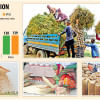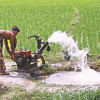Bangladesh govt to make rice import costlier
With farmers ready to reap rice in the year's biggest rice season -- Boro -- in a week amidst concern over poor market price, the government is considering further raising the tariff on the crop to restrain its import.
The government is also set to decide tomorrow on the volume and the purchase price of Boro it would procure from the local growers this season.
Farmers are worried about the price due to cheap rice import, through both formal and informal channels, from India.
Talking to The Daily Star yesterday, Agriculture Minister Matia Chowdhury said the government was mulling over imposing a 10 percent supplementary duty on top of the 20 percent tariff that has been there since last November to arrest rice import.
She said this year's Boro procurement volume and price would be declared at a meeting of the Food Planning and Monitoring Committee scheduled for tomorrow.
Asked whether the government would provide farmers with any price incentives so that they would start cultivating other crops, Matia said, "This year's rice production costs would be considered while announcing the Boro procurement price."
Boro acreage dropped to 46.60 lakh hectares this year from last year's 48.40 lakh hectares. The Department of Agriculture Extension has set a target of production at 1.90 crore tonnes of rice during the Boro season, which is more than half of the country's annual rice production.
Many attribute the trend in Boro acreage shrinkage to low rice price that acts as disincentive to growers. However, the minister has got some other explanations.
She said her ministry had long been pursuing to promote rain-fed Aman and Aus cultivation so that pressure on highly irrigation-intensive Boro is minimised. Winter rice Boro is highly taxing for fast depleting groundwater, particularly in the country's north.
Import of cheaper rice in Boro harvesting season is a price dampener. Comparing to last financial year (2014/15) -- when private traders imported over 14 lakh tonnes of rice from India, the first eight months of this fiscal year (2015-16) saw hardly 3 lakh tonnes of import, thanks to the 20 percent duty imposed last year on rice import.
But there are complains of informal rice import through porous Indo-Bangla border.
The parliamentary standing committee on agriculture also cautioned the ministries concerned last week against unrestrained import of rice at a time when Indian granaries are trying to get rid of some of their old stocks.
There is criticism of government foot-dragging in announcing Boro procurement price. Last year, it made the announcement a month ahead of crop harvesting but this time it is getting late.
Though the government procures hardly one-twentieth of the total production, the official procurement rate has some impacts on determining the commercial rice price in the wholesale and retail markets.
Tajamul Haque cultivates Boro less than half the areas he did last year. Reached over the phone, the Nachol (Chapainawabganj) farmer said he thought releasing some of his Boro land free for growing mustard, lentil and wheat would be more profitable.
Given the current rice price hovering around Tk 600 to 650 a maund, Tajamul now thanks his business sense.
A report released in late March by the United States Department of Agriculture stated that growing wheat and corn are more profitable for farmers in Bangladesh than cultivating Boro.

 For all latest news, follow The Daily Star's Google News channel.
For all latest news, follow The Daily Star's Google News channel. 








Comments